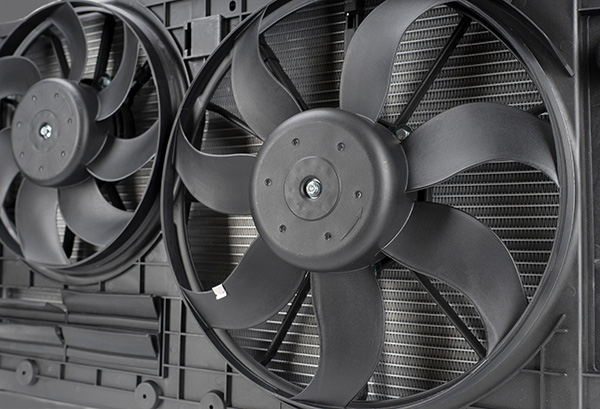
Noticing your cooling fan running after you turn off the engine can be confusing, but it isn’t always a sign of trouble. Many modern vehicles are designed to let the fan keep spinning to help cool the engine or prevent heat buildup under the hood. That said, if the fan stays on for too long or runs constantly, it could point to an issue with the cooling system, a faulty sensor, or an electrical problem. Knowing what’s normal and what’s not can help you catch problems early and avoid unnecessary repairs.
Why the Cooling Fan Stays On After You Shut Off the Car
Modern engines run hotter than older ones because they’re designed for efficiency and reduced emissions. That means they need better cooling—and the fan is part of that equation.
When you park after a long drive or after sitting in traffic, the engine might still be above its target temperature. So, even though you’ve turned the car off, the cooling fan may stay on briefly to bring the temperature back down to a safe level.
This is especially common in warmer weather, during stop-and-go driving, or after uphill climbs. In fact, some vehicles are designed to run the fan for up to five minutes after the engine is shut off. It helps prevent heat soak, which can cause damage to internal components if not managed properly.
When the Running Fan Is Actually a Problem
If your cooling fan runs for more than five to ten minutes or if it keeps turning on repeatedly even after the engine has cooled down, that’s not normal. It could mean your engine isn’t cooling properly or that a component is feeding false information to the system.
Common causes include:
- A faulty coolant temperature sensor, which tells the fan when to activate
- A bad fan relay or stuck circuit that keeps power going to the fan
- Low coolant, causing the engine to overheat more easily
- A malfunctioning thermostat, preventing proper coolant flow
- Issues with the engine control module mismanaging signals
In some cases, your check engine light might come on if the fan behavior is tied to a sensor or cooling issue. But other times, the fan just keeps running with no clear warning—making it even more important to pay attention.
Can It Drain Your Battery
The cooling fan is electric, so yes—it draws power from your battery. But most systems are designed to limit how long the fan runs after shut-off. If it stays on longer than intended, especially if you're taking short trips and restarting frequently, it can eventually weaken your battery, especially if the alternator doesn’t have time to fully recharge it.
If you've noticed your battery struggling to turn over after repeated instances of the fan running post-shutdown, it's worth getting the system checked. You could be dealing with a stuck relay or an electrical fault that's pulling power when it shouldn’t.
What to Do When You’re Unsure
If the fan runs for just a minute or two and then shuts off, there’s usually no reason to worry. But if it keeps running longer—or starts behaving erratically—it’s time for a professional to take a look.
Here’s what we will check:
- Coolant levels and condition
- Fan relays and wiring
- Temperature sensor readings
- Thermostat operation
- Any stored trouble codes from the engine computer
A quick inspection can rule out simple issues like low coolant or a stuck relay and help you avoid bigger problems like overheating or battery drain.
When the Problem Hides in Plain Sight
Many drivers assume that once the car is off, everything under the hood stops working—but that’s not always the case. Even if your dashboard looks normal and there’s no warning light, the cooling system could still be struggling behind the scenes.
Over time, overheating—even minor or infrequent—can wear down engine components and lead to premature gasket failure, warped cylinder heads, or even total engine damage. That’s why it’s important not to ignore unusual fan behavior, even if the car seems to drive fine.
Don’t let an overheating or a fan issue sneak up on you. Visit Premier Automotive Service in Urbandale, IA, for a fast diagnosis and expert repair that keeps your engine protected.